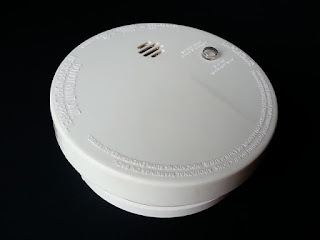The concept of an overly sensitive alarm system reminds me in some ways of the evangelical fundamentalist Christian who camps outside an adult bookstore, strip club, or similar venue and harasses the clientele. She is undoubtedly concerned about "moral decay," but her sensors for detecting it are way too sensitive. Like the smoke detector that seems to go off every time you cook, she howls about "whores" and "fornicators" at every opportunity. Fortunately, I think that most people would agree that she's every bit as annoying as the broken alarm system that detects problems that aren't there. Even here in Mississippi where evangelical fundamentalist Christianity is the norm, the howling crusader does not usually have as much company as you might expect.
This time of year (i.e., October), my thoughts often turn to a somewhat different scenario: the perpetually outraged identity-politics-obsessed social justice warrior who camps out in the aisle of the local store where people buy Halloween costumes in order to police their choices. She's may not be Christian, but she's no less religious. It is just that her religion is about being "woke." She's there to make sure nobody commits the "sin" of cultural appropriation, and her tactics are similar to that of the evangelical fundamentalist Christian. She'll start with public shaming and quickly move on to changing store policy or even trying to close the store if they do not comply. She does not go around calling people "whores" or "fornicators" because that would be slut-shaming; she prefers "racists" and "misogynists."
There are some differences between "holy rollers" and social justice warriors, but it often seems like they have a great deal in common. Both suffer from overly sensitive sensors for detecting what they inevitably regard as social problems. They descend into outrage long before anybody else detects a problem. Once outraged, they see their role as one of punishing those they deem offensive. Both are fond of public shaming, and both are eager to restrict our options by prohibiting what they find objectionable. Both have developed their own jargon, which helps them identify like-minded individuals and separate them from those of us who cannot be trusted.
One of the biggest differences has to do with how the rest of us react to them. As I noted above, much of what the evangelical fundamentalist Christian crusaders do elicits little support and is regarded as annoying. This is far less likely to be the case when it comes to social justice crusaders. It seems that those of us on the left have a far easier time brushing off the criticism we receive from Christian fundamentalists than we do from woke fundamentalists. That will probably change as we tire of their antics, but it has been surprisingly slow to change.
I don't know about you, but there isn't much about fundamentalism I find appealing. It wasn't the Christian flavor that led to my distaste of Christian fundamentalism; it was the fundamentalism. As a result, I've never had the impulse to replace Christian fundamentalism with some other flavor of fundamentalism. That includes "woke" fundamentalism. When the sensors in the alarm system are clearly broken and detect things that aren't there, we are going to get plenty of false alarms. If we can't easily fix the sensors, we can at least learn to ignore the false alarms.
